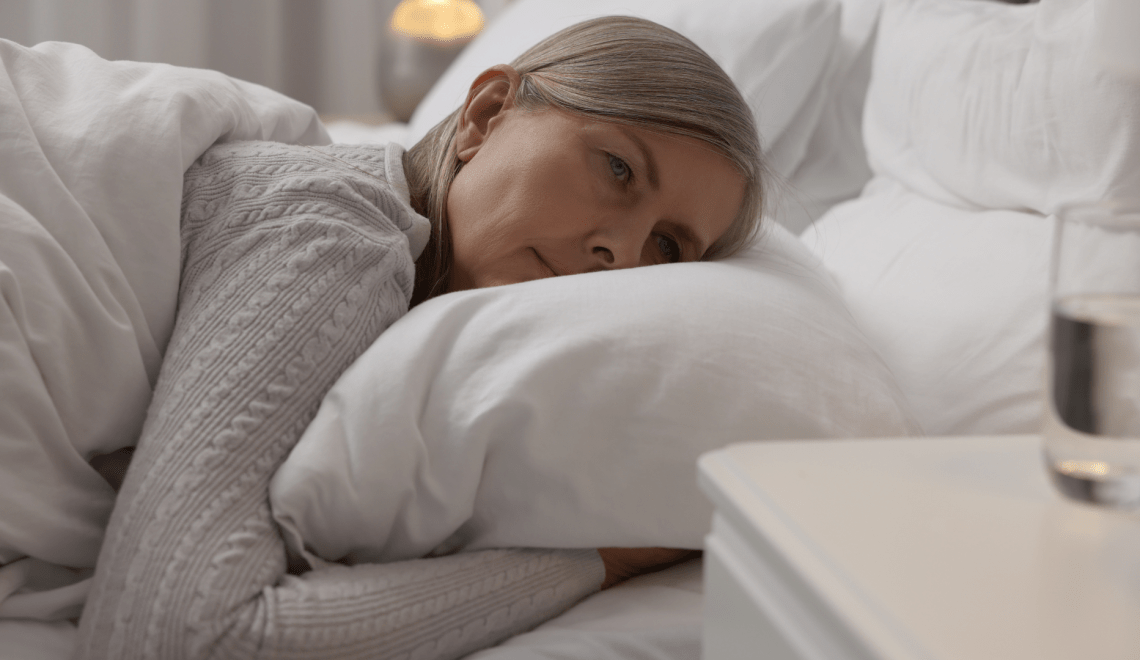
It’s a common experience for women in menopause: It’s the dead of night, and you find yourself abruptly awoken, drenched in sweat, with your sheets clinging uncomfortably to your skin. Night sweats can be disruptive and bewildering, leaving you tossing and turning, desperate for relief.
With the right information and support, you can get the relief you need to sleep through the night.
The Science Behind Night Sweats
Night sweats are more than just a minor inconvenience disrupting your peaceful slumber. They are often indicative of an underlying issue that warrants attention. These episodes result from the body’s attempt to regulate its temperature, causing excessive sweating even in cool, comfortable environments.
Common triggers include hormonal imbalances, stress, infections, medications, and certain medical conditions. The hypothalamus, the region in your brain tasked with regulating body temperature, significantly contributes to nighttime events.
When your body senses an internal temperature spike, the hypothalamus kicks into overdrive, initiating sweating to cool you down. This mechanism can be disrupted by various factors, leading to unpredictable bouts of night sweats that leave you feeling clammy and fatigued the next day.
Menopause and Night Sweats
Night sweats are often caused by menopause, which is a natural phase in a woman’s life characterized by hormonal changes. During menopause, estrogen levels fluctuate, triggering the hypothalamus to send conflicting signals to the body, resulting in intense heat sensations and subsequent sweating, particularly during sleep.
Night sweats often disrupt rest and rob women of much-needed sleep. The connection between menopause and night sweats is undeniable, casting a shadow over the otherwise transformative journey women undergo during this period.
Exploring Menopause Supplements
Menopause supplements like MENO can provide hope and relief for those navigating menopausal night sweats. These supplements typically contain a blend of herbs, vitamins, and minerals that aim to combat hormonal imbalances and alleviate menopause symptoms, including night sweats.
From black cohosh to ashwagandha, these supplements boast natural ingredients with purported benefits in reducing the frequency and intensity of night sweats. While their efficacy varies from person to person, many users find relief in the potential comfort these supplements may provide during frustrating menopausal nights.
Lifestyle Changes To Combat Night Sweats
Making small lifestyle adjustments can have a big impact on night sweats. Ensuring proper sleep hygiene, such as maintaining a consistent bedtime routine and creating a cool, dark sleep environment, can significantly improve sleep quality and reduce the occurrence of night sweats.
Additionally, managing stress through relaxation techniques like meditation or deep breathing exercises can assist in calming the body’s response to triggers that contribute to night sweats. Engaging in regular physical activity and adopting a balanced diet rich in nutrient-dense foods can also help reduce the frequency and severity of these episodes.
Sleeping Gear and Environment Adjustments
Embarking on a quest for cooler, more comfortable nights requires a holistic approach that extends to your sleeping environment. Consider adjusting your sleeping gear and surroundings to create an atmosphere conducive to restful sleep, devoid of night sweats.
Opt for breathable bedding made from natural fibers like cotton or bamboo, which allow for better air circulation and moisture-wicking properties to keep you cool throughout the night. Explore cooling pillows or mattress toppers designed to regulate body temperature and elevate comfort levels, providing a space for undisturbed slumber.
Make sure your bedroom is a cool, tranquil space where you can rest easily. Regulate room temperature, invest in a fan or air conditioning, and keep the space clutter-free to promote optimal relaxation. Small changes in your sleep environment can yield significant improvements in combating night sweats and enhancing overall sleep quality.
When To Seek Medical Advice
Persistent or severe episodes of night sweats warrant a visit to your healthcare provider. Night sweats that disrupt your daily life, occur alongside unexplained weight loss, or are accompanied by additional symptoms require medical evaluation to rule out underlying health conditions, such as infections, hormonal imbalances, or even more serious issues.
Consulting a healthcare professional can provide valuable insights into the potential causes of your night sweats and guide you toward appropriate treatment options. Remember, your well-being is a priority, and seeking medical advice when needed is a proactive step in addressing and managing your night sweat concerns effectively.
Navigating Night Sweats With Confidence and Care
Managing night sweats may seem daunting, but armed with knowledge and a proactive approach, you can find calmer nights and rejuvenating sleep. From making lifestyle adjustments to using menopause supplements, a multifaceted approach can pave the way to peaceful slumbers free from the discomfort of night sweats.
Embrace the journey, consulting healthcare experts when necessary, and prioritizing self-care to reclaim your nights and restore harmony to your sleep routine. Remember, quality sleep is not a luxury but an essential pillar of well-being, and by addressing your night sweat concerns, you pave the way for restful nights and brighter mornings ahead.
Mindful Motherhood: 6 Easy Ways To Show Up For Yourself Each Morning








